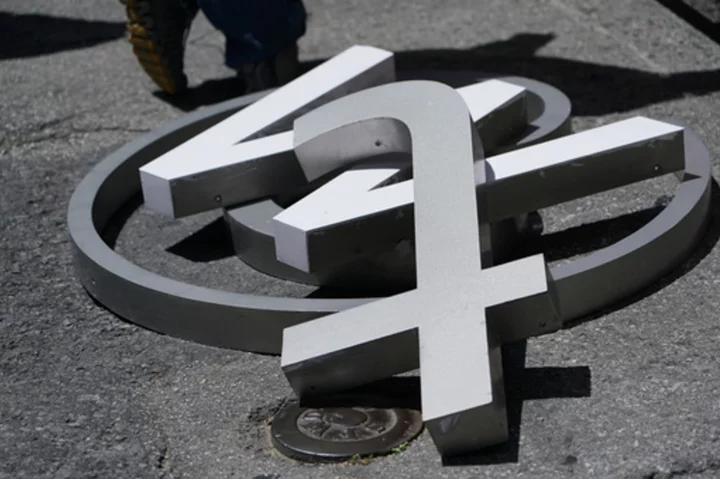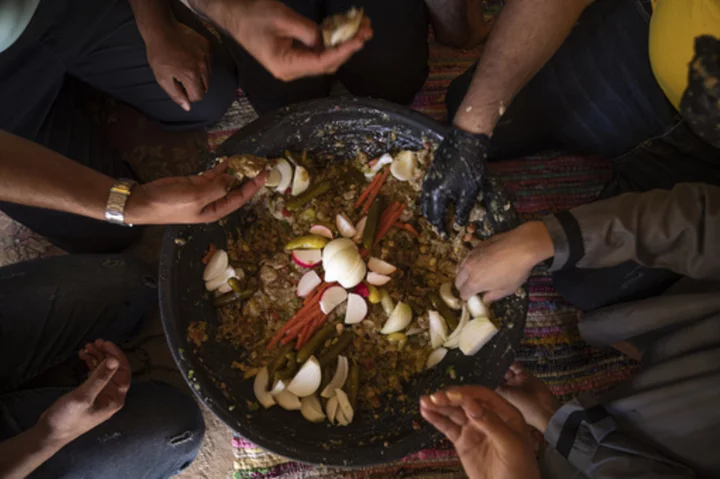The release of the first group of Israeli women and children taken hostage by Hamas is — at least in part — the result of an intense campaign waged by their families.
On the night of the Oct. 7 assault, during which Hamas militants killed 1,200 Israelis and kidnapped 240 others, the government of Israeli Prime Minister Benjamin Netanyahu spoke of a single goal: “the destruction of the military and governmental capabilities of Hamas and Palestinian Islamic Jihad.”
Four days later, hostages were again left unmentioned at a press conference alongside war cabinet chiefs. It took two more weeks for Netanyahu to say out loud: “we have set two goals for the war: eliminate Hamas and do everything possible to return our hostages home.”
The shift was driven by family members.
One key player was Avichai Brodutch, whose wife and three young children were abducted. He scrawled a homemade sign saying, “My Family is in Gaza,” and stood alone outside the Defense Ministry in Tel Aviv, attracting a crowd.
At the same time, Dudi Zalmanovich, a powerful lawyer with a relative taken to Gaza, and Ronen Zur, a public relations guru, established the “Hostages and Missing Families Forum.” They gathered information and set up a data base, soon joined by former spy and security chiefs, celebrities and film directors.
‘Hostage Square’
A ‘hostage square’ was set up across from where the government was meeting. Outside the Tel Aviv Museum of Art, tables were set up with 240 empty places for a Shabbat meal.
Huge billboards with hostage photos cropped up on every corner as well as in New York’s Times Square and other international cities. Three floors of an office building in Tel Aviv became a headquarters for the families. They walked for four days from the city to Jerusalem joined by thousands, disrupting traffic.
“We had a few hundred volunteers within days, and now have between 1,000 and 1,500, some working full time and some a few hours a week,” said Daniel Shek, a former Israeli ambassador to France. He heads the group’s diplomatic relations and has sent delegations to Greece, the US, Canada, Belgium and Germany.
Dozens of the hostages are dual nationals and the goal has been to get foreign officials to pressure Netanyahu. Gili Roman, whose sister Yarden holds a German passport and is believed to be held in Gaza, went to Berlin and met with Chancellor Olaf Scholz.
“In the first couple of weeks, the number one priority was beating Hamas, winning the war,” Shek said. “We pushed for the priority to be the hostages. We may have played a role, and I am proud of what we did.”
Ground Troops
Those being released now are among the more than 30 children and dozens of women taken when Hamas operatives broke through the border to Israel and shot their way into the neighboring communities, killing and abducting.
After several weeks of punishing air attacks by Israel in its war on Hamas, the question arose of sending in ground troops, but many feared that would endanger the hostages. Netanyahu and his defense chiefs argued that the way to persuade Hamas to yield hostages was to pressure them militarily. This was their way of joining the war’s two goals into one campaign.
Israel’s war is aimed at destroying the Hamas infrastructure, much of which is underground in tunnels, where hostages are presumed to be held. In the process, it has killed more than 13,000 Gazans, according to the Hamas-run health ministry, and reduced much of the crowded seaside strip to near rubble.
It’s a toll that has shocked many abroad. Israel blames Hamas for operating among its civilians and says the war must be brought to a conclusion to prevent a repeat of what happened on Oct. 7.
In exchange for 50 Israeli hostages to be released over the coming three days, Israel is permitting truckloads of humanitarian aide and freeing 150 Palestinian women and minors it holds in its own prisons. Hamas, which is considered a terrorist organization by the US and European Union, can extend the truce by a day for each additional 10 hostages it releases.
Some in Israel have argued that the authorities should, if needed, offer to release all 6,000 Palestinians it holds in prison to get their hostages home.
There seems little likelihood of that happening. The last time Israel released a huge number of prisoners in exchange for one of its own, among those released was Yahya Sinwar. He’s been the head of Hamas in Gaza for the past five years and viewed by Israel as the mastermind of the Oct. 7 massacre.
--With assistance from Henry Meyer.









